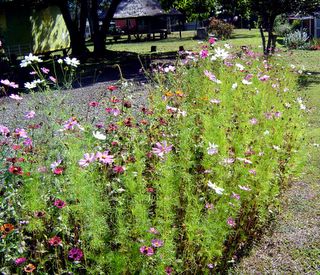Saturday: I love it when it looks and feels like a real Saturday. And yesterday it was! Today it’s been overcast and cloudy, but that’s ok as I had homework and had to stay inside.
Just watched Tanim, profiling what happened in the enga province during the national elections here in 2002. (an sbs doco; get it if you ever see it around. There are a number of good docos on png, but distribution seems a problem.) I knew there had been trouble and deals done, but – as ever – actually seeing what happened is pretty bad.
On paper it’s a democratic process, but in practice it’s based along traditional lines: people will vote according to clan allegiances, so the political leaders need to make pacts with clans in order to guarantee votes. This means the average person’s vote is decided by their leaders, and will be filled out on voting day by someone else. (In one scene, a voting official has been ordered by the incumbent member to hand over a district’s voting papers to his (the member’s) son to fill out; you see the son calmly filling out page after page, a tick for his father every time.)
Tanim profiles two people from the same clan who were running (unusual; typically there wouldn’t be internal competition, someone would have to stand down). Most of the clan sided with the incumbent, but not all: there was a split. There were fights on voting day when a leader tried to get all of the voting papers in order for his crew (in a little dark shed) to fill them out. One man resisted, wanting to choose his own vote, and shouted angrily: “Give me my voting papers! It is my right! And this is my new wife! It is my right to vote for her too!”
You can see why very very few women run for office up in the highlands, let alone get in; it’s a man’s game from top (the traditional leaders dealing with the political leaders), out in public (rallies 98% male) to bottom (the young guys with guns, fighting neighbouring villages whose allegiance is with another party: storming, destroying, controlling their land).
I don’t know much about how things went in other provinces and in the big cities. (Have a dateline episode on this to watch later. Watching in now would be too much reality for one afternoon.) The next election is sometime in 2007 (I’ll be gone by then); I have a friend who was considering running, but found out his competition has already started campaigning, buying boats for certain key areas. There’s two years to go: my pal simply can’t compete with that kind of money. Two years; I cannot even imagine how much money is spent in campaigning here.
Just watched Tanim, profiling what happened in the enga province during the national elections here in 2002. (an sbs doco; get it if you ever see it around. There are a number of good docos on png, but distribution seems a problem.) I knew there had been trouble and deals done, but – as ever – actually seeing what happened is pretty bad.
On paper it’s a democratic process, but in practice it’s based along traditional lines: people will vote according to clan allegiances, so the political leaders need to make pacts with clans in order to guarantee votes. This means the average person’s vote is decided by their leaders, and will be filled out on voting day by someone else. (In one scene, a voting official has been ordered by the incumbent member to hand over a district’s voting papers to his (the member’s) son to fill out; you see the son calmly filling out page after page, a tick for his father every time.)
Tanim profiles two people from the same clan who were running (unusual; typically there wouldn’t be internal competition, someone would have to stand down). Most of the clan sided with the incumbent, but not all: there was a split. There were fights on voting day when a leader tried to get all of the voting papers in order for his crew (in a little dark shed) to fill them out. One man resisted, wanting to choose his own vote, and shouted angrily: “Give me my voting papers! It is my right! And this is my new wife! It is my right to vote for her too!”
You can see why very very few women run for office up in the highlands, let alone get in; it’s a man’s game from top (the traditional leaders dealing with the political leaders), out in public (rallies 98% male) to bottom (the young guys with guns, fighting neighbouring villages whose allegiance is with another party: storming, destroying, controlling their land).
I don’t know much about how things went in other provinces and in the big cities. (Have a dateline episode on this to watch later. Watching in now would be too much reality for one afternoon.) The next election is sometime in 2007 (I’ll be gone by then); I have a friend who was considering running, but found out his competition has already started campaigning, buying boats for certain key areas. There’s two years to go: my pal simply can’t compete with that kind of money. Two years; I cannot even imagine how much money is spent in campaigning here.

No comments:
Post a Comment